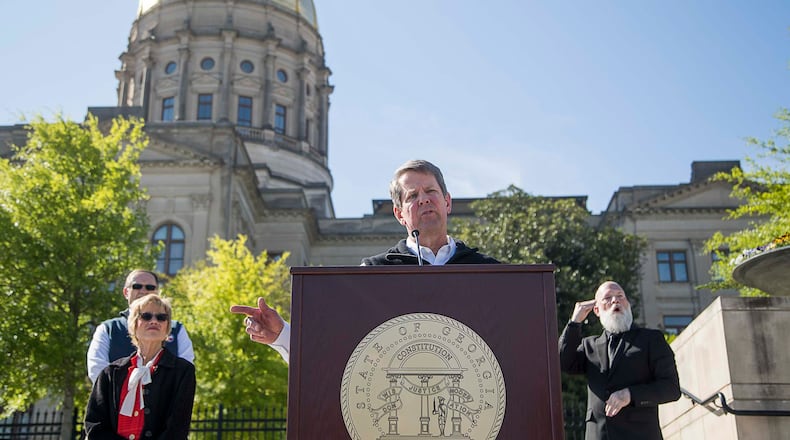Gov. Brian Kemp said Wednesday that he lacks the power to delay Georgia's May 19 primary even as he announced he would issue a statewide shelter-in-place order amid the coronavirus pandemic.
The election is moving ahead despite pressure from all 11 of the state's Republican members of Congress, who signed a letter Tuesday urging Secretary of State Brad Raffensperger to change the primary date.
Kemp and Raffensperger, both Republicans, said Georgia election laws prevent them from postponing the primary. Kemp said he can’t use emergency powers that last until April 13 to move the May election.
“The attorneys I’ve talked to, I don’t have the authority under this (emergency) order to delay an election,” Kemp said. “I know there’s been a lot of talk about that. We’ve got our hands full in the COVID-19 fight.”
Raffensperger, who already delayed the presidential primary once, said he also lacks the authority to change it again. A state law allows the secretary of state to postpone an election for 45 days during an emergency, as Raffensperger did March 14.
MORE: A map of coronavirus cases in Georgia
MORE: Real-time stats and the latest news on the coronavirus outbreak
The election could still be postponed at a later date, Raffensperger said.
“If and when the governor extends the state of emergency, we can re-evaluate the situation and determine if moving the election is appropriate in light of the circumstances in order to best protect the health and safety of voters, election officials and poll workers,” Raffensperger said.
The Democratic Party opposed stalling the election, saying the government should make it easier for people to vote by mail by paying for postage on absentee ballots.
“Rather than delaying the vote, it is critical that the state expand vote-by-mail and make it accessible for more voters,” said Nikema Williams, the chairwoman of the Democratic Party of Georgia.
Calls to postpone the primary mounted this week with a combined effort from the state’s entire Republican congressional delegation.
“Georgia voters should not be asked to choose between exercising that right and following the guidance of federal, state, and local officials to keep themselves, their families, and our communities healthy,” the delegation wrote in a letter Tuesday to Raffensperger.
The letter was signed by U.S. Sen. David Perdue, U.S. Sen. Kelly Loeffler and Georgia’s nine Republican House members.
They're backed by state House Speaker David Ralston, who said Wednesday that widespread use of absentee-by-mail voting in the primary would hurt Republican candidates.
All 6.9 million active voters in Georgia are being mailed absentee ballot request forms this week by the secretary of state's office. Voters who return the absentee ballot request forms will be able to participate in the primary without having to come into contact with other people on election day or during early voting.
"This will be extremely devastating to Republicans and conservatives in Georgia," Ralston, a Republican from Blue Ridge, said during an interview with Fetch Your News, a North Georgia news site. "Every registered voter is going to get one of these. … This will certainly drive up turnout."
Republicans say high voter turnout favors Democrats, although that is not always the case. Ralston doesn’t want the mail-in primary to set a precedent for future elections in which heavier use of mail-in ballots drives turnout higher in the general election, when the parties compete against each other.
Ralston said he agreed with President Donald Trump’s criticism of proposals by Democrats for changes in elections such as increased voting by mail and same-day voter registration.
“The things they had in there were crazy. They had things, levels of voting that if you’d ever agreed to it, you’d never have a Republican elected in this country again,” Trump said Monday on “Fox & Friends.”
Though Ralston wants the primary date moved, a change in state law allowing it to be further delayed is unlikely during the suspension of the Georgia General Assembly amid the coronavirus pandemic.
Kemp's broad emergency powers, approved last month by the General Assembly, allow him the ability to suspend state laws, take direct control of civil staffers, restrict travel and limit public gatherings. It's unclear whether his powers will be renewed after they expire in two weeks.
Keep Reading
The Latest
Featured




